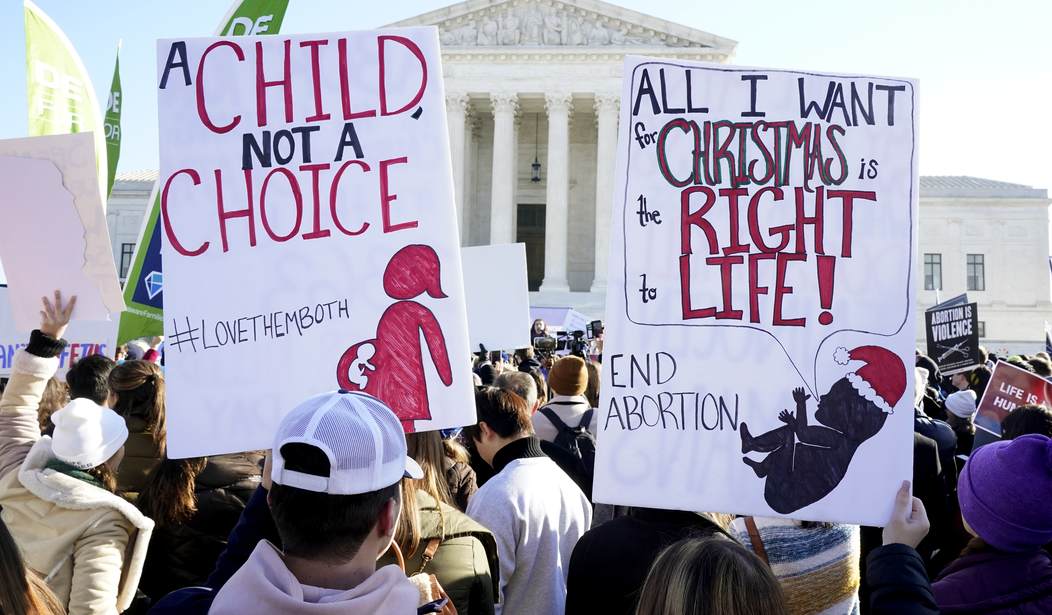Great news for the March for Life, which will take place today, and perhaps an even better omen for what the court will do in Dobbs. Last month, the Supreme Court ruled that challenges to Texas’ abortion law could target state officials under certain circumstances despite how the legislature wrote SB8. Rather than send one case all the way back to the federal district court, though, the Supreme Court remanded it back to the appellate court that has refused to issue a stay in the case.
That has abortion-rights activists and three of the justices seeing red:
The Supreme Court on Thursday rejected a request from abortion providers in Texas that a federal judge be allowed to take prompt action on their challenge to a state law that bans most abortions after six weeks. The practical effect of the order, the three liberal justices wrote in dissent, was to let the law stay in place indefinitely.
“This case is a disaster for the rule of law and a grave disservice to women in Texas, who have a right to control their own bodies,” Justice Sonia Sotomayor wrote in dissent.
The majority gave no reasons for its ruling, which followed a decision last month allowing the providers to sue at least some state officials to try to block or limit the law. That victory was an empty one, the dissenting justices wrote on Thursday, because the United States Court of Appeals for the Fifth Circuit, in New Orleans, refused to return the case to the trial judge and instead sent it on a legal detour to a state court.
“It has been over four months since Texas Senate Bill 8 took effect,” Justice Sotomayor wrote. “The law immediately devastated access to abortion care in Texas through a complicated private bounty-hunter scheme that violates nearly 50 years of this court’s precedents.”
Stephen Breyer also wrote a brief dissent, noting that the Fifth Circuit should have handed this back to the district court after its previous ruling regarding standing. Failing that, the Supreme Court should have ordered it. Sotomayor’s dissent goes into more detail on that point, although neither of them give much credit to the fact that Texas issued a new challenge that the appellate court is considering:
After this Court issued its judgment, however, the litigation stalled. The Fifth Circuit should have immediately remanded this case to the District Court, allowing it to consider whether to issue preliminary relief. But Texas moved to certify to the Supreme Court of Texas the question this Court had just decided: whether state licensing officials had authority under state law to enforce S. B. 8. Texas never asked the Fifth Circuit to certify this question during its first pass through that court, nor did it ever ask this Court to do so. Even so, a Fifth Circuit panel indulged the request by scheduling oral argument. Judge Higginson dissented from the court’s decision to do so, explaining that he “d[id] not read the Supreme Court’s judgment, especially in a case of this magnitude and acceleration, to countenance such delay.” Whole Woman’s Health v. Jackson, No. 21–50792 (Dec. 27, 2021), p. 1.
On January 3, 2022, the petitioners requested a writ of mandamus from this Court ordering the panel below to remand the case to the District Court. At argument before the Fifth Circuit four days later, one judge on the panel raised the notion that because this Court is considering a challenge to Roe v. Wade, 410 U. S. 113 (1973), the panel could “just sit on this until the end of June” rather than fulfill its obligation to apply existing precedent.
Sotomayor may have good reason to grumble on procedural grounds, but it’s likely because the other justices know that their ruling in Dobbs will settle this either way. If the court upholds the Mississippi law in Dobbs, it has to overturn Roe and Casey and all its precedential subsequent decisions. If that happens, Texas will simply change SB8 into a state-enforced limitation on abortions and end the controversy. If, on the other hand, the Supreme Court strikes down Mississippi’s law in Dobbs, it will have upheld Roe and almost certainly Casey as well. And the net effect of Texas’ law is so clearly obstructive of abortion access that the Supreme Court will eventually have to strike down the Texas law at some point, too.
By keeping this percolating, this hints that the court might already have decided to strike down Roe and Casey. It could mean, though, that they’re just keeping their options open for the moment, and want to wait as long as possible to address the weird standing definition created by Texas in their attempt to end-run Roe. In the meantime, fewer babies are being aborted in Texas, which is good news regardless whatever happens in Dobbs for those human lives that will not be snuffed out.








Join the conversation as a VIP Member